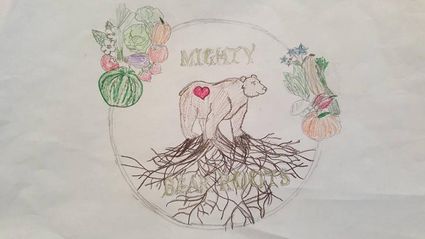Wrangell resident a business startup competition finalist

Submitted Illustration
A design concept for the Mighty Bear Roots logo, a business idea being pitched by local resident Dixie Booker to the Path to Prosperity grant program.
A Wrangell resident has been named among this year's Path to Prosperity competition finalists.
Dixie Booker has put forward a proposal to cultivate and sell fresh produce. Called Mighty Bear Roots, the business would involve the construction of a 72-by-30-foot greenhouse housing a series of aeroponic growing towers.
Gardening since childhood, Booker has only recently experimented with this less conventional method, which maximizes space and conserves resources by arranging plants vertically.
"I kept coming across these towers, so last summer I went out and bought one," she said.
Plants grown in the tower are rooted in a soilless medium called rockwool, and sustained through a blend of mineral nutrients and water.
The plants tend to grow quickly in this environment, and despite a late start for the season in August, Booker was pleased with how her test crop of strawberries, tomatoes and lettuce turned out.
"We still had quite a bit of produce come out of it," she said.
One aeroponic tower can accommodate up to 20 plants, and in the greenhouse Booker is envisioning her business could maintain approximately 3,700 plants. Plus the greenhouse environment and a ground-to-air heat transfer system would allow her to cultivate 10 or 11 months out of the year.
Though she has assisted other businesses in the past, this would be the first one Booker has run from the ground up. She had entertained the idea of starting a home business several years ago, and with her interest in gardening was drawn to the idea of local agribusiness but the initial costs of building a greenhouse were daunting, and so the idea was shelved.

Booker said her friend Valerie Jensen had been the one to introduce her to the P2P program, which seemed like an ideal opportunity to get her idea some traction. A partnership between the Haa Aaní Community Development Fund and the Nature Conservancy, P2P aims to support local entrepreneurs and their communities throughout Southeast Alaska. For the past four years, its annual competition vets business proposals, selecting 12 finalists to receive consultation and technical advice for their ideas.
"We're trying to provide them the tools, and also give them the chance to connect with their resources," explained Paul Hackenmueller, HACDF economic development coordinator and administrator for the P2P program.
Of the dozen finalists, two businesses are each year selected to receive up to $40,000 apiece in startup funding. Even after the competition, the program continues to stay in touch with previous finalists and work closely with its winners, working with them to invest wisely and continue developing their business strategy.
From the program's perspective, this approach helps boost local commerce while also benefitting their prospective communities. Part of the process of assessing business proposals put forward for the competition is evaluating local impact and need.
In Booker's case, she thinks locally grown produce would improve Wrangell's food options, and would add to the self-sufficiency already evident in local subsistence and fishing traditions. She has been undertaking a survey to gauge local needs as well, using the Survey Monkey website. The questionnaire can be accessed online at http://www.surveymonkey.com/r/ZK8T7FY.
"It's a need that needs to be filled," Booker has concluded. "We're lacking when it comes to the produce side of it."
She suspects food quality might improve a bit as well, as most produce available to the island's residents must be transported by barge, diminishing its shelf life. Booker also was surprised at the wide variety of produce which can be grown using the aeroponic towers, another benefit to the method.
"I want to grow a bit of everything," she said. While currently focused on growing leafy greens and tomatoes, she has an interest in doing pumpkins, melons and squash as well. Booker said she would continue to tweak and change her model as business eventually grows.
Jensen had helped her put together her P2P submission, one of 44 the program received for its 2016 competition.
"It was a very competitive year," said Hackenmueller. "There's a really interesting but I also think exciting breadth of industry coming to us."
There's been an uptick in the number of agricultural business ideas put forward this year, but finalists also include ideas for a sawmill, coffee company, visitor services and seafood processing. Of the 12 picked as finalists, an independent panel of five judges will select two plans to receive seed funding for developing the business. Competition winners will be announced next February at the Innovation Summit.
In the meantime, all 12 finalists will benefit from P2P's Business Boot Camp held in Juneau in September. Finalists will have access to business mentors from around the region, receiving one-on-one consulting on how to better develop their ideas and business plans, as well as how to effectively run them going forward.
"We're really, really excited," Booker said.
Would-be entrepreneurs interested in P2P are encouraged to visit http://www.p2pweb.org, for details on the program and for information on how to join the 2017 competition.



Reader Comments(0)